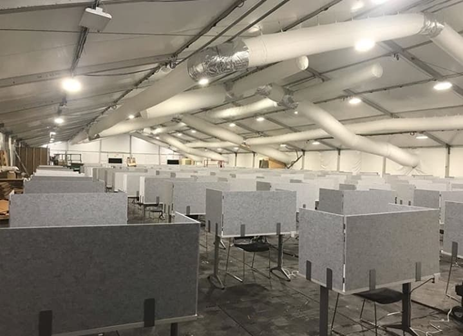How is WashU Handling Covid-19?
Like all major universities, WashU has been hit heavily by the COVID-19 pandemic, and has struggled to adjust to our new “separatist” way of living. And, like most universities, it’s taken its fair share of criticism for how it’s handled the unprecedented demand for virtual classes and vacated dorms. Here, we’ll be running down the basics of how WashU has been providing for its students during 2020, the Year of the Pandemic. Classes: the University, overall, has carried out a huge shift in how its classes are conducted, expanding online access and changing class formats to better suit remote learning. Most classes at WashU are now conducted completely virtually over Zoom. Other classes – called “Hybrid classes” – may still have an in-person component, but are likely to be highly reduced and only meet a few times a week. These classes are also making allowances for students who may not be able to attend in-person. Finals and exams are being held virtually, or being changed to final projects, presentations, etc. Labs: Many labs, especially those centered around data collection, will be moved wholly online. Some “wet labs” will continue, however, to be offered in person. Using the extra space from labs moved online, WashU will be ensuring that these labs have ample space for social distancing. WashU’s yearly calendar has also adjusted to minimize student travel. Following many other universities, WashU has eliminated Fall Break. Additionally, students who return home for Thanksgiving Break will not be allowed to return to campus during the final weeks in December. Finals will be held from January 4-10 (ick). The Spring Semester will begin on January 25th, and end in May. WashU has also extended the time in which students can opt to take one of their classes Pass/Fail, to 12 weeks. For more information on how remote learning is being conducted at Washu, we recommend you check out where the main college, ArtSci, has posted a compendium of Q&As on their website. Stress: Many students and teachers that I know have described high levels of stress, particularly when it comes to guidelines being hard to understand, and administration mandates constantly changing. WashU was highly criticized for how it handled dorm evacuations in the spring semester: students on Spring Break were told not to come back, and WashU attempted to ship their belongings to them at home in a process that was full of snafus and major inconveniences. Libraries: WashU has closed its libraries to the public, and has changed the way checkout and borrowing work for students. Materials are now available for curbside pickup, and departments are working to provide more digital materials on the Olin library website. Access to printers has been limited to certain points. Socially-distanced study pods have also been set up. Study Pods: WashU has attempted to provide students with distanced “Zoom-Study-Dine” pods, to approximate the normalcy of studying at a library or lounge on campus. However, students have criticized these pods on the grounds of discomfort and unattractiveness. As you can see from student pictures, pods set up in industrial HVAC tents can look cold and regimented: Dining: WashU’s dining program has been very thorough in its protocol this school year, from wiping down all surfaces every 30 minutes to designated hand sanitizer checkpoints. Most dining is now grab-and-go: while students can still eat in dining areas, they’re advised to eat in their own living spaces instead. So while traditional study/eating rituals like grabbing a coffee at Whispers or studying in a booth at BD are no longer possible, Dining Services is doing a great job of keeping safe. WashU’s departments managing financial aid and tuition have been changing a lot around to address the pandemic. Tuition: WashU’s tuition remains the same, despite largely virtual classes. In the event that WashU has to go all-virtual in the future, they will also not be providing any refunds. Financial aid: WashU is encouraging students with financial aid to re-submit their requests to accommodate new financial circumstances, like family events, change in location, and loss of work. They’re also offering students in need a significant technology credit with which to buy adequate computers and equipment for home learning. While WashU may decrease financial aid for students who are living at home instead of renting dorms, in most cases, they’re not cutting any financial aid at all. WashU’s insistence on charging full price for tuition, as well as its bungles during dorm evacuations, should definitely be on the mind of anyone looking at this school with a mind toward COVID (or, frankly, future pandemics). Students can expect safety, but – as with everything else at WashU – they can also expect a hefty price tag. For more information on WashU, you can check out CollegeVine’s advice on WashU essay prompts and admissions statistics. If you want to know your chances of getting into WashU, check out CollegeVine’s free chancing engine. It’ll let you know how you stack up against other applicants, and it’ll also give you tips for improving your profile. Sign up for your free CollegeVine account to get started!How are classes being conducted at WashU?

How is on-campus life at WashU?

Is WashU mindful of the financial implications of COVID-19?
Looking Forward

